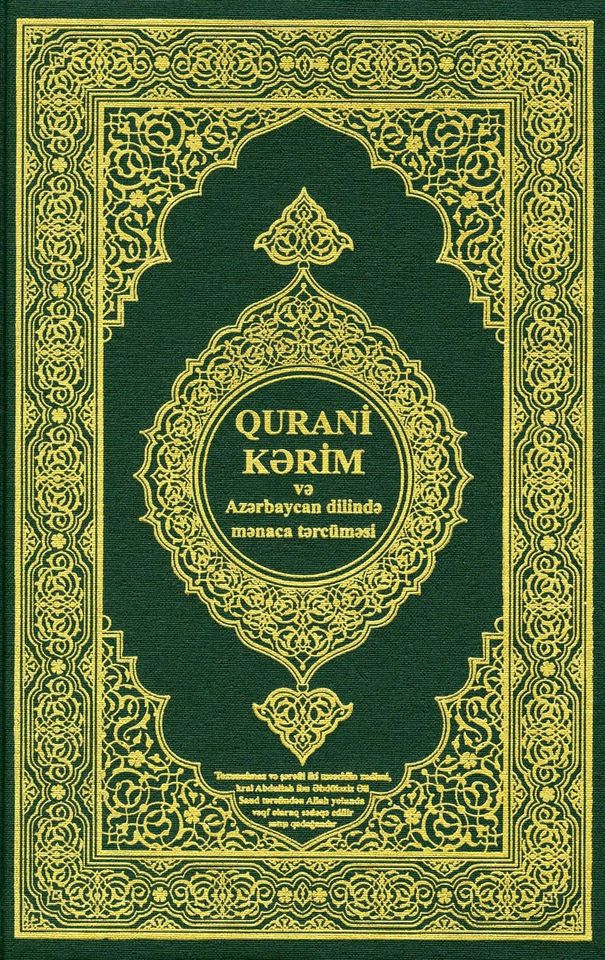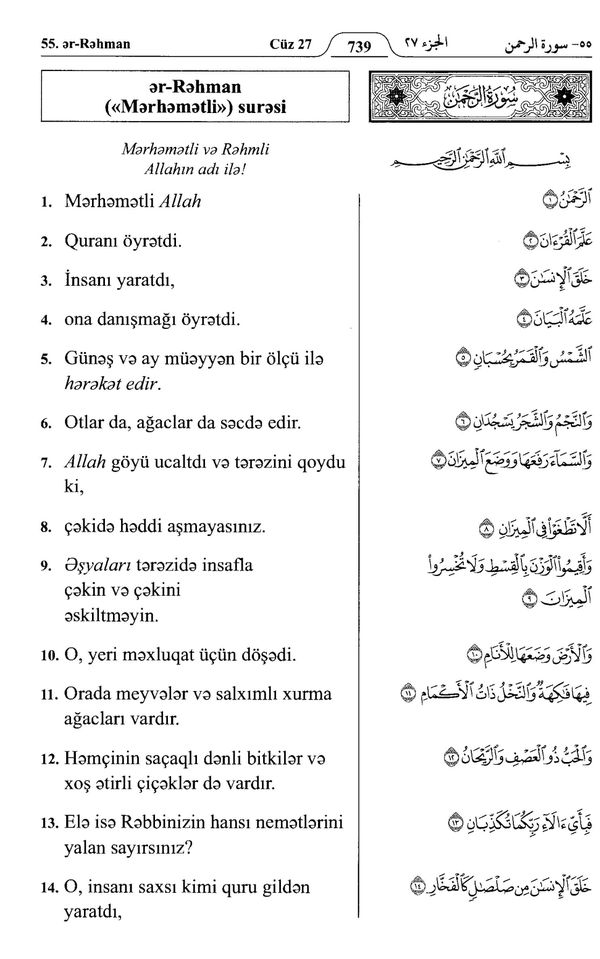Due to the rich tradition of representing Islam in Azerbaijanian (the language spoken by 25 million people), there are a number of modern translations of the Qur’an. For example, translations by Ziya Bunyadov and Vasim Mammadaliyev (1991), Nariman Gasimzade (1994), Memmedhasan Ganioğlu and Tariyel Rilaloğlu (2000) and Aladdin Sultanov (2011) were all made directly from the Arabic text. The first of these was commissioned by the centralized Islamic religious board in Baku, Qafqaz Müsəlmanları İdarəsi. It must be emphasized that, in contrast to other post-Soviet areas, Azerbaijan has a predominantly Shi’i population (around 60%). However, the general ideology of the state is to implement a “multiculturalism model” which prevents any direct criticism of Sunni or Shi’i beliefs in religious discourse. This has affected the field of Qur’an translation somewhat, making it unclear whether the translator has Shi’i or Sunni background.
The King Fahd Complex (KFQPC) in Saudi Arabia published an Azerbaijanian translation twice: in 1425 AH (2004, Al-Fatiha and Juz’ ‘Amma, i.e. Q. 1 & 78-114), and then in 1433 AH (2013, complete). This was typical of KFQPC: to start with a new language by issuing a partial translation first. For example, they started with Juz’ ‘Amma in Tamazight, Swedish and Russian. Unfortunately, the print does not provide name of the translator; but further consultation revealed that it was the first draft of Alikhan Musayev’s translation, which was published later in the same year under the title “Qurani-Kərim və Azərbaycan dilinə mənaca tərcüməsi”. After graduating from the Islamic University of Madinah, Musayev returned to Azerbaijan to start his career as a preacher as well as translator of Islamic literature from Arabic. This includes large parts of the hadith corpus like Sahih al-Bukhari and Sahih Muslim. The complete translation of the Qur’an into Azerbaijanian (KFQPC 2013) does not include much introductory information. A short statement from the translator mostly consists of Qur’anic verses selected to emphasize the divine origin of the Qur’an and the importance of following it.
Only the final paragraph touches on translation as a tool to convey the main teachings of the Qur’an: ethics (əxlaq), lawful and forbidden (halal və haram), life after death (Axirət həyati) etc. In contrast to most other translations from KFQPC, this rendition does not include any commentary apart from some minor interpolations in italics (referents of Arabic pronouns like -hu, -ha, -hum etc.).
Plentiful Arabic loan words in the Azerbaijanian language (much more than in modern Turkish, for example) make it possible to preserve almost all basic religious vocabulary; e.g. Q 2:2-4 is rendered: “Bu, qətiyyən şübhə doğurmayan, müttəqilərə doğru yol göstərən bir Kitabdır. O kəslər ki, qeybə iman gətirir, namaz qılır və Bizim onlara verdiyimiz ruzidən Allah yolunda xərcləyirlər. O kəslər ki, sənə nazil olana və səndən əvvəl nazil olanlara iman gətirir, axirətə də yəqinliklə inanırlar”.
Some of the basic words here correspond to Arabic concepts (muttaqin – müttəqilər, gayb – qeybə, akhirah – axirətə, yuqinun – yəqinliklə), in addition to the widely used words like iman. No tafsirs are mentioned, but contemporary Salafi theology seems to be a primary reference for interpreting some verses. Musayev renders the beginning of Q 2:255 as: “Allah Özündən başqa haqq məbud olmayandır” (“He is Allah! There is no object of worship but Him”). Compare Aladdin Sultanov’s translation: “Allah! Ondan başqa tanrı yoxdur” (“Allah! There is no god but He alone”). Musayev’s choice of məbud (“object of worship”) rather then tanrı (“deity”) indicates the Salafi concept of godhood (ulūhiyyah) as “oneness of God in worship”. For this and other reasons, Alikhan Musayev’s translation quickly became popular on Islamic web-sites, mobile apps, etc. and it also appeared in print from a Baku publishing house after the KFQPC edition. At least among Sunni Muslims (especially Salafis), this seems to be one of the most cited works on the Qur’an in Azerbaijanian.
Mykhaylo Yakubovych


